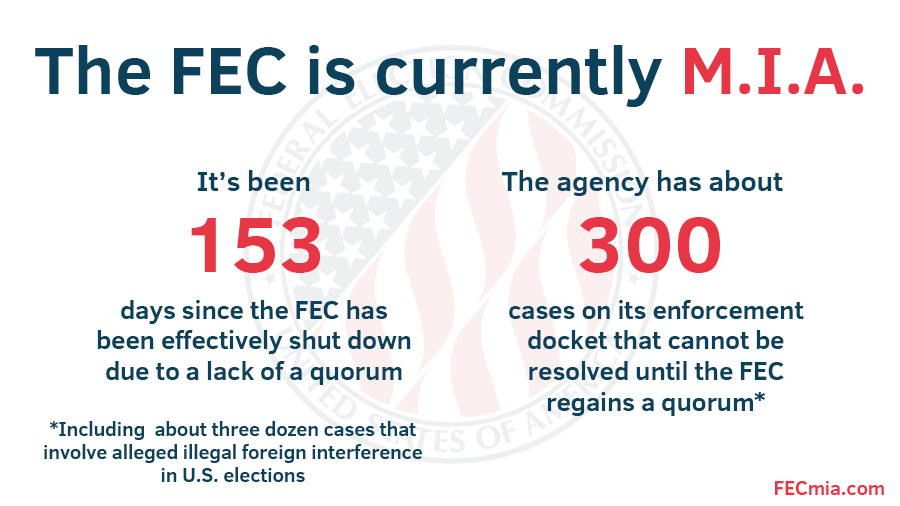Analysis
Congress has collectively spent 94 years fundraising since 2015
Since 2015, our elected leaders have had to spend hours fundraising, instead of doing their jobs. One of the biggest problems with our campaign finance system is that the…
Analysis
Today marks the start of the sixth month since the Federal Election Commission (FEC) lost its ability to do its job due to the resignation of one commissioner. Three seats on the six-member FEC are now vacant, leaving the agency that oversees all federal campaign finance issues one person short of a quorum.
Without a quorum, the FEC cannot resolve enforcement actions against those who violate the nation’s campaign finance laws, craft new rules, hold meetings, or issue legal guidance to candidates or political groups.
It’s up to the president to nominate, and the Senate to confirm, new commissioners.
Here are six numbers that show how the FEC is missing in action at a critical time of the 2020 election.
153: Number of days — and counting — that the FEC has been without enough members to conduct official business such as promulgating new rules, issuing legal advice, or fining violators of campaign finance law.
300: Approximate number of cases on the FEC’s enforcement docket that cannot be resolved until the FEC regains a quorum. About three dozen of these cases involve alleged illegal foreign interference in U.S. elections.
68: Number of pending enforcement cases for which the statute of limitations could expire if the FEC does not soon regain a quorum.
8: Number of public meetings that the FEC had to cancel in 2019 because it lacked the quorum necessary to conduct business. No public meetings will be held in 2020 until the FEC regains a quorum.
1: Number of reports from the FEC’s Inspector General that have raised concerns about the lack of the quorum necessary to conduct most official business. This report called the lack of a quorum the “most significant management and performance challenge” facing the agency.
100%: Portion of the FEC’s three currently serving commissioners who are serving on expired terms. While a term on the FEC is designed to be six years, the most junior FEC commissioner has been serving for nearly 12 years (roughly double a normal term) and the longest-serving FEC commissioner has been serving for more than 17 years (roughly three times a normal term).
Learn more about what can be done to fix the FEC at FECMIA.com, a project of Issue One.
Issue: Federal Election Commission

